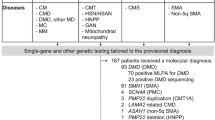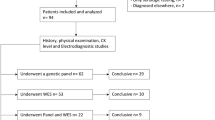Abstract
A nationwide survey was conducted for predictive genetic testing for late-onset, incurable neurological diseases. A questionnaire was sent to 125 university hospitals and national hospitals, and was returned by 69% of them. Of the 86 responding hospitals, 63 had genetic counseling clinics and answered the questions concerning predictive testing. Of these, 46 had experienced clients with an interest in or a request for predictive testing during the period from April 2004 to March 2006. A total of 322 clients were accumulated, the majority of which were interested in myotonic dystrophy (n = 150), followed by spinocerebellar ataxia (n = 86), spinal and bulbar muscular atrophy (n = 40) and Huntington’s disease (n = 31). Most such clients were counseled by medical doctors, who had the “Japanese Board of Medical Genetics, Clinical Geneticist” certification, but others, including neurologists, nurses, clinical psychologists or genetic counselors also contributed, albeit to a lesser extent, to genetic counseling in Japan. Many respondents felt that a multidisciplinary approach by a counseling team consisting of a clinical geneticist, a neurologist, a genetic nurse, a clinical psychologist and a genetic counselor had not yet been established. There will be a great need for educated and trained non-medical doctor staff not only to improve the quality of genetic counseling and psychological support for such clients, but also to conduct the psychosocial research on Japanese clients requesting predictive genetic testing.
Similar content being viewed by others
Log in or create a free account to read this content
Gain free access to this article, as well as selected content from this journal and more on nature.com
or
References
Abe K, Itoyama Y (1997) Psychological consequences of genetic testing for spinocerebellar ataxia in the Japanese. Eur J Neurol 4:593–600
Benjamin CM, Adam S, Wiggins S, Theilmann JL, Copley TT, Bloch M, Squitieri F, McKellin W, Cox S, Brown SA, Kremer HPH, Burgess M, Meshino W, Summers A, Macgregor D, Buchanan J, Greenberg C, Carson N, Ives E, Frecker M, Welch JP, Fuller A, Rosenblatt D, Miller S, Dufrasne S, Roy M, Andermann E, Prevost C, Khalifa M, Girard K, Taylor S, Hunter A, Goldsmith C, Whelan D, Eisenberg D, Soltan H, Kane J, Shokeir MHK, Gibson A, Cardwell S, Bamforth S, Grover S, Suchowersky O, Klimek M, Garber T, Gardner HA, MacLeod P, Hayden MR (1994) Proceed with care: direct predictive testing for Huntington disease. Am J Hum Genet 55:606–617
Brandt J (1994) Ethical considerations in genetic testing: an empirical study of presymptomatic diagnosis of Huntington’s disease. In: Fulford KWM, Gillett G, Soskice JM (eds) Medicine and moral reasoning. Cambridge University Press, London, pp 41–59
Chapman E (2002) Ethical dilemmas in testing for late onset conditions: reactions to testing and perceived impact on other family members. J Genet Counsel 11:351–367
Craufurd D, Tyler A, on behalf of the UK Huntington’s Prediction Consortium (1992) Predictive testing for Huntington’s disease: protocol of the UK Huntington’s Prediction Consortium. J Med Genet 29:915–918
Decruyenaere M, Evers-Kiebooms G, Boogaerts A, Cassiman JJ, Cloostermans T, Demyttenaere K, Dom R, Fryns JP, van den Berghe H (1995) Predictive testing for Huntington’s disease: risk perception, reasons for testing and psychological profile of test applicants. Genet Counsel 6:1–13
Evers-Kiebooms G, Decruyenaere M (1998) Predictive testing for Huntington’s disease: a challenge for persons at risk and for professionals. Patient Educ Couns 35:15–26
International Huntington Association (IHA), World Federation of Neurology (WFN) (1994) Guidelines for the molecular genetics predictive test in Huntington’s disease. Neurology 44:1533–1536
Mandich P, Jacopini G, Di Maria E, Sabbadini G, Chimirri F, Bellone E, Novelletto A, Ajmar F, Frontali M (1998) Predictive testing for Huntington’s disease: ten year’s experience in two Italian centres. Ital J Neurol Sci 19:68–74
Muto K (1998) Attitudes toward pre-symptomatic testing and social services for families with Huntington’s disease in Japan. J Health Care Soc 8:67–82 (in Japanese)
Quaid KA (1992) Presymptomatic testing for Huntington disease: recommendations for counseling. J Genet Counsel 1:277–302
Robins Wahlin T-B, Bäckman L, Lundin A, Haegermark A, Winblad B, Anvret M (2000) High suicidal ideation in persons testing for Huntington’s disease. Acta Neurol Scand 102:150–161
Taylor SD (2004) Predictive genetic test decisions for Huntington’s disease: context, appraisal and new moral imperatives. Soc Sci Med 58:137–149
Yoshida K, Tamai M, Kubota T, Kawame H, Amano N, Ikeda S, Fukushima Y (2002) Analysis of 14 individuals who requested predictive genetic testing for hereditary neuromuscular diseases. Clin Neurol 42:113–117 (in Japanese)
Acknowledgments
The authors would like to acknowledge the respondents participating in this study. This work was supported by the Study Group for improving community medicine for patients with intractable diseases from the Ministry of Health, Labor and Welfare (KY, SI), and also by grants from the Ministry of Education, Culture, Sports, Science and Technology (YF).
Author information
Authors and Affiliations
Corresponding author
Rights and permissions
About this article
Cite this article
Yoshida, K., Wada, T., Sakurai, A. et al. Nationwide survey on predictive genetic testing for late-onset, incurable neurological diseases in Japan. J Hum Genet 52, 675–679 (2007). https://doi.org/10.1007/s10038-007-0170-1
Received:
Accepted:
Published:
Issue date:
DOI: https://doi.org/10.1007/s10038-007-0170-1
Keywords
This article is cited by
-
Investigating the role of genetic counseling in neuromuscular disease considering life events
Journal of Human Genetics (2019)
-
Follow-up nationwide survey on predictive genetic testing for late-onset hereditary neurological diseases in Japan
Journal of Human Genetics (2013)



